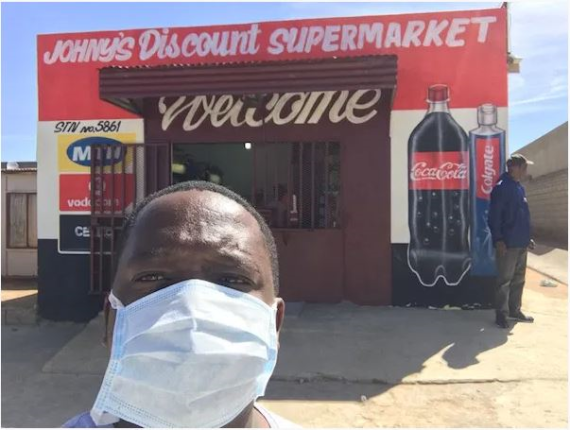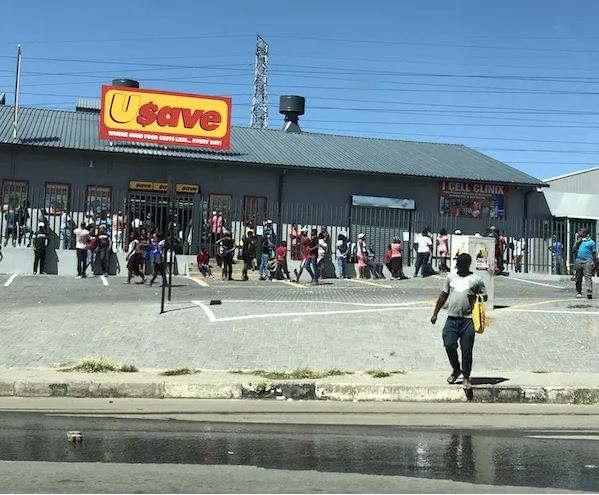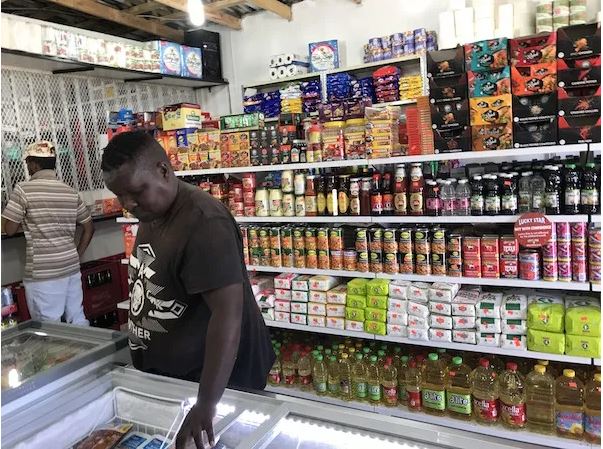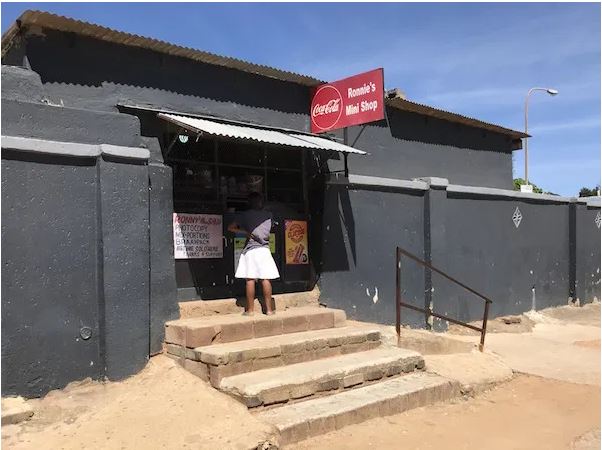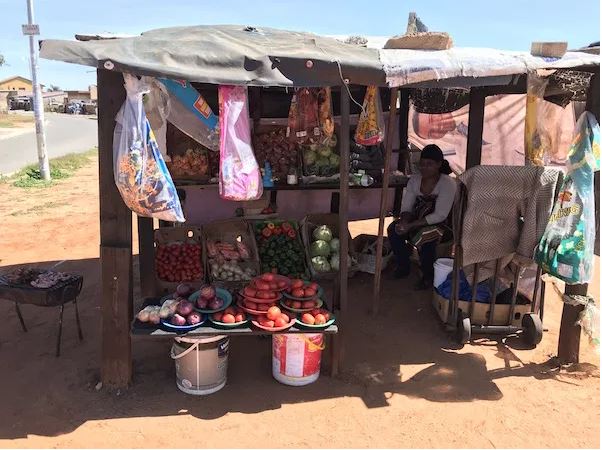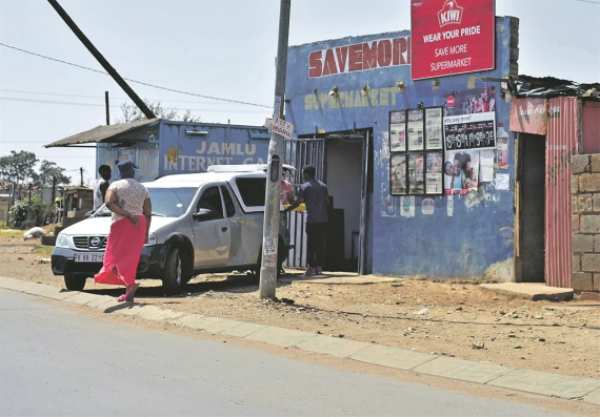Foshizi's Lebo Motshegoa outside a spaza shop
This consumer research report delves into the various challenges facing consumers at the bottom of the pyramid, within the context of the global pandemic and national lockdown.
It unpacks and identifies how business-to-consumer (B2C) organisations such as brands, retailers and banks can rise up to the occasion in a meaningful way and support the poor while driving consideration with their custodians.
Furthermore, the analysis highlights how businesses will have to gear up for a very different world following the lockdown period. To this end, it will be critical to identify key areas where brands can begin to bring pertinent and compelling solutions to consumers and in order to remain relevant.
In the end, the report settles on the conclusion that there is no certainty about what the ‘new normal’ looks like and in the absence of concrete answers, what remains is the fact that B2C businesses should ensure they become consumer-centric through constant connection with the consumer, allowing them to remain strategic yet nimble.
Research background
The coronavirus has brought on many challenges the world over, and South Africa’s emerging market and those at the bottom of the pyramid (BOP) are arguably experiencing the worst of it.
Foshizi Research & Insights managing director, Lebo Motshegoa, had an opportunity to be in field during the first 21 days of the lockdown, working with the SA COVID-19 government teams. In between, he was able to conduct ethnographic research in Soweto, Alexandra, Kagiso, Mamelodi, CosmoCity, Tembisa and the surrounding informal settlements. The Foshizi teams also conducted this research in Kwa-Zulu Natal, specifically KwaDabeka and informal settlements in Pietermaritzburg.
Key findings
1. The research found that the lockdown was not adhered to in the strictest sense of the word; if anything, there is a very loose application of the rules. This is driven by two main issues: the gravity of the pandemic has not yet sunk in and hunger, a grim reality for many South Africans, is forcing the poor out of their homes in search for food or opportunities to earn money and feed their families.
It became evident lockdown is easier on nuclear families, but has created immense pressure on extended families.
The exceptionally tight living spaces in the homes of the emerging market and the BOP, where an average of five to eight people can occupy one room, does not allow one to comfortably stay indoors for extended periods.
2. As a means of escape, television and the cellphone have never been more important for the consumer, and brands should leverage this and use it effectively. Above the line can now reach a wider target, but the key issue is to ensure you’re reaching the right consumer at the right time and this should be supported by digital to drive further engagement.
Consumers are spending more time on social media not only to pass time but also to connect with friends, family and the outside world; however, data remains the main barrier. If brands are going to engage with consumers on digital, they will need to ensure that they use airtime and data as a hook.
3. If Facebook didn’t have enough impact before, it certainly does now. During the lockdown, consumers at the BOP mention that Facebook is one platform that has enabled them keep in touch with the world through Facebook Lite and Facebook Free Mode. FB Free Mode allows them to see text only and images are greyed out; they can still chat, see status updates and comments without the use of data, driving more traffic to the platform.
4. Insurers who underwrite burial societies and stokvels will need to rethink their value and their unique selling proposition under the ‘new normal’. The observance of norms and cultural practices around funerals have always been sacred within the black community. In order to enable adherence to these cultural practices, many will take out insurance cover or join a Burial society to cover the family against the exorbitant costs of a funeral in the event of the of death of a loved one.
The funds will be used to cater to the many mourners that decent upon the home once the announcement of death has been made, monies also go towards bus hire, a tent and chairs, vehicles for the family procession and an animal that will be slaughtered, amongst other costs.
COVID-19 Regulations for Attendance at Funerals has set a limit of 50 people who can attend a funeral. This is followed by a cumbersome process of obtaining a travel permit as stipulated in the regulations issued by the Minister of Co-operative Governance and Traditional Affairs.
Without a doubt, it begs the question, will funeral insurance in its current format still have a place in the new world? And if so, what does the new burial ‘package’ look like post-COVID19?
The answers are not clear, as to what extent will social distancing and self-preservation change the way people send off their loved ones? And will the ancestors approve? And finally should cultural norms and customs fall away because they are unaffordable
5. We are likely to see shopping behaviour evolve even further. The most predictable being the fact that the purchase of groceries is now driven by price and affordability instead of personal choice, followed by availability with another key variable being versatility. One product with multiple uses such as the Sunlight brick soap considered ideal for bathing, and washing clothes; or mielie meal, which is an essential calorie providing carbohydrate and can be had as either a porridge at breakfast or the starch at supper time.
6. Another key development is the fact that the shopper is now not necessarily the consumer. While mom used to be the primary household grocery purchaser before, dad has taken over this role in many instances, based purely from the fact they would rather be the ones to brave the scary world of COVID-19, rather than the more vulnerable members of the household.
7. Shoppers now navigate store aisles differently as they cannot go into certain parts of the store. They are ‘forced’ to navigate the store according to what they are permitted to buy, they also now have to shop new and unfamiliar categories, as mentioned by one responded, “I am now buying hand sanitiser, something I have never had to buy in my life before”.
The in-store decision making criteria has also changed, as shoppers now actively seek out products with strong functional benefits such as ‘Kills 99% of all germs’ or ‘with added vitamins’ as opposed as to good taste, pleasant aromas or even packaging.
8. Having intercepted a number of spaza shops and a few of their customers while on the ground, one might think that spaza shops should be busier, as many would be shopping at their local spaza store to avoid traveling to the bigger malls, but this is not necessarily the case. If anything, business is dwindling in the informal trade.
This is driven by a number of factors, one of which is the list of items that cannot be sold during the lockdown. Small items such as cigarettes, Rizla papers, or even snuff drive traffic to the spaza shop, which usually turns into a bigger purchase, this shopping occasion is no longer the same. Interestingly, children’s snacks are not moving off the spaza store shelves as quickly anymore as the core purchaser, ‘kids’, are indoors. To make matters worse, spaza shops must be closed by 18:00, which is way early than usual.
9. Arguably, the biggest loser in this whole equation has been the street vendor, who has gone through the emotional rollercoaster of the permit confusion and crackdown. Street vendors who make up just over 1.1-million in South Africa, according to StatsSA. Unlike Spaza stores, street vendors draw in many buyers through the sale of loose cigarettes and airtime, who then end up purchasing other products such as fresh produce, are seeing significant declines to their daily sales.
10. In absence of alcohol, consumers are turning to soft drinks, albeit, begrudgingly. Soft drinks are taking the space of alcohol as the next best thing to drive conversation and bonding as people hang around at home. Spaza store owners have also seen an increase of sales in this category. However, unlike their usual vices, non-alcoholic beverages do not quite hit the spot.
“I now have to drink ginger ale because I can’t get beer, and I am worried that this amount of ginger could have adverse effects on my well-being,” said one beer drinker.
Article Source: https://themediaonline.co.za/2020/04/on-the-ground-township-consumer-lockdown-report/


